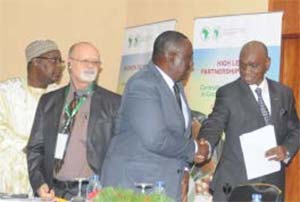
West and Central Africa rally against fall armyworm
A two-day high-level meeting on controlling fall armyworm (FAW) in West and Central Africa took place on 11 and 12 September in Yaoundé, Cameroon.
In attendance at this meeting organized by the African Development Bank (AfDB) in collaboration with IITA and Technologies for African Agricultural Transformation (TAAT) were ministers of agriculture from the subregions, focal points from the respective Agriculture ministries in the two sub- regions, scientists, and experts from different organizations.
Hon. Eyebe Ayissi, Cameroonian Minister for Agriculture, declared the meeting open and welcomed the subregional approach to tackling the fall armyworm menace whose invasion is a threat to the resilience of cereal cropping systems in Africa.
[su_quote]“Sustainable management of this pest needs a multi-stakeholder approach with the cereal growers in the middle of such an approach. While efforts to build the natural regulatory factors of the pest (biological control, building resistance among host plants, etc.) are undertaken, farmers need advice, tools, resources, risk management options, and a conducive environment to sustainably manage fall armyworm,” Hon. Ayissi added.[/su_quote]
In a similar vein, Gaston Cossi Dossouhoui, the Beninese Minister for Agriculture, Livestock and Fishery, commended the organizers for the initiative which he described as timely.
[su_quote]“In Benin, more than 33,000 hectares have been reportedly destroyed by fall armyworms, amounting to 44,500 tons of production lost, about 3.4% of the forecast national production for 2016– 17,” Hon. Dossouhoi said.[/su_quote]
The Deputy Director General, Partnerships for Delivery at IITA, Dr Kenton Dashiell, called for an integrated approach against the rampaging insect in Africa. He stressed the need for a coherent policy framework and a combination of chemical and biological control measures in the aggregated efforts against the caterpillar.
Also present at the meeting were representatives of the Food and Agriculture Organization (FAO), IITA, AfDB, Syngenta, and DVA Agro.
The impact of fall armyworm in Africa
Fall armyworm or Spodoptera frugiperda, is an insect that is native to tropical and subtropical regions of the Americas. In its larval stage, it can cause significant damage to crops if not well managed.
It prefers maize but can feed on more than 80 additional species of plants including rice, sorghum, millet, sugarcane, vegetable crops, and cotton.
Fall armyworm was first detected in Central and Western Africa in early 2016 and since then has been reported and confirmed in all of mainland Southern Africa (except Lesotho), Madagascar, and the Seychelles (Island State).
To date, fall armyworm has been detected and reported in almost all of sub-Saharan Africa, except in Djibouti, Eritrea, and Lesotho.


